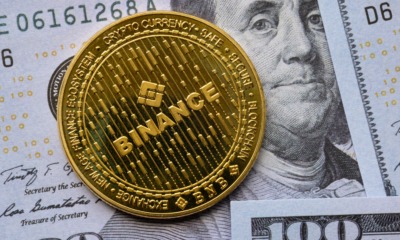Don't Miss
Why no one should be using banks

If government is the devil, the bank is a demon.
It’s not your money anymore.
The moment you put your money on your bank account it becomes the property of the bank. Legally speaking you have just lend your money for minuscule interest. And since the money is not your, terms do apply, so you cannot withdraw all of them in one day, if the amount is high.
Government will know everything
Today banks are obligated to tell the authorities everything they know about you, including how much money you have, how you got it and where you spend it. The golden age of bank secrecy is over. Of course if you are a law abiding citizen, you might think that you have nothing to hide, but it’s not about hiding stuff. It’s about basic human right, and rightness for private life. The government should not be allowed to watch you.
Banks ask too many stupid questions
It’s your money, you rightfully earned them, but still you need to explain to the bank where you got it from and be shamed by them. The funny part is that after long and painful due diligence process the bank may still decline in providing service for you.
They can legally suspend your account or even steal your money
Laws are not made to protect people, they are made to protect the government from the people. And this is the reason why government can legally take all your money from your bank account, and the bank will of course let them. And not to mention suspending your account for uncertain amount of time, which happens so often that everyone familiar to it.
Banks are making profit with your money and you are getting almost nothing in return
A typical bank has hundreds billions of €/$/£ of clients funds at it’s disposal and it pays less than 1% yearly interest on that, which is lower than the inflation. People basically give money to the bank for free and banks make millions of profit with it. That’s very good business, is it not?
Banks have too much power
Money is power. We all know that. And by giving our money to the banks we are giving them power. A lot of power. So much power that they basically control our society. This power can be only taken away if people and companies would stop using banks.
You can loose all your money if the bank goes bankrupt
Luckily in EU the government will back up your funds up to 100k€, but it’s only that. If you have over 100k€, the rest will be gone. And if you are using non-EU bank the back up amount can be significantly lower or lack completely.
Money transfer services provider by banks are worse than the ones offered by their competitors.
Today sending money via bank is the slowest option. The only thing that could be slower is to send cash by physical mail. Average bank transfer takes 1–2 days for IBAN transfer and 3–4 days for SWIFT transfer. And guess what? They don’t work on weekends. But with every online wallet and with crypto currencies you can send funds instantly, so why use banks in the first place?
Banks are no longer needed
The original idea of the bank as institution was quite useful. The point was that you would give your money to trusted 3rd party and they would keep them safe for you, so that thieves and criminal syndicates such as governments would not be able to steal it from you. But today banks provide security only from common thieves and there are lot of others secured options. Besides the crime rate has dropped significantly from what it was hundred years ago, so even if you keep cash at home in coffer and have some alarm system it will most likely be safe there.
There are better options available
Bitcoin and other crypto currencies are safer, more secured and government proof, so why use the worst solution?
Written by Filip Poutinstev
Don't Miss
A Guide to Exploring the Singaporean ETF market

Singapore’s Exchange Traded Fund (ETF) market has grown, offering investors diverse investment opportunities and access to different asset classes. As the market evolves, investors must navigate these uncharted waters with a clear understanding of Singapore’s ETF landscape. This article explores the trends, challenges and strategies for navigating the Singapore ETF market. To start investing in ETFs, you can visit Saxo Capital Markets PTE.
The Singaporean ETF Market: Exponential Growth
The Singapore ETF market has seen significant growth in recent years, with an increasing number of ETFs covering a wide range of asset classes and holders. different investment topics.
One of the notable trends in the Singapore ETF market is the growing diversity of available options. Investors can now choose from ETFs that track domestic and international stock indexes, bonds, commodities, and specialist sectors or themes. This diverse range of ETFs allows investors to create comprehensive portfolios tailored to their investment goals.
The growth of the ETF market in Singapore is also due to growing investor demand for low-cost, transparent, and accessible investment vehicles. ETFs offer benefits such as intraday liquidity, real-time pricing, and the ability to trade on exchanges. These characteristics have made ETFs attractive to retail and institutional investors who want exposure to different asset classes.
Regulatory Landscape and Investor Protection
The Monetary Authority of Singapore (MAS) is the…
Don't Miss
Property Loans for Foreigners in Singapore That You Must Know About

Intending to invest in a residential or commercial property in Singapore?
When it comes to foreigners applying for a loan in Singapore, things can be pretty hard regardless of the reason whether you need the property for personal or business purposes.
In Singapore, buying a property is challenging, whether you are a foreigner or a native, and sometimes applying for a loan is the only way for you to afford it.
HOW MUCH CAN YOU BORROW FOR A PROPERTY LOAN IN SINGAPORE?
As for the Foreigner Loans, in Singapore, there is an exact amount of money you can borrow to finance the purchase of a property.
In this sense, Singapore has the Loan to Value Ratio (LTV).
The LTV ratio is what determines the exact amount of money you can borrow for a property loan, which changes depending on where you try to obtain the loan:
- If you are applying for a bank loan, you can borrow a maximum of 75% of the value of the property you want to purchase. That means if you are looking for a property that costs $500.000, the maximum amount of money a bank lender can give you like a loan in Singapore is going to be $375.000.
- When you are applying for a loan with a Housing…
Don't Miss
CoinField Launches Sologenic Initial Exchange Offering

CoinField has started its Sologenic IEO, which is the first project to utilize the XRP Ledger for tokenizing stocks and ETFs. The sale will last for one week and will officially end on February 25, 2020, before SOLO trading begins on the platform. Sologenic’s native token SOLO is being offered at 0.25 USDT during the IEO.
Earlier this month, Sologenic released the very first decentralized wallet app for SOLO, XRP, and tokenized assets to support the Sologenic ecosystem. The app is available for mobile and desktop via the Apple Store and Google Play. The desktop version is available for Windows and Mac.
“By connecting the traditional financial markets with crypto, Sologenic will bring a significant volume to the crypto markets. The role of the Sologenic ecosystem is to facilitate the trading of a wide range of asset classes such as stocks, ETFs, and precious metals using blockchain technology. Sologenic is an ecosystem where users can tokenize, trade, and spend these digital assets using SOLO cards in real-time. The ultimate goal is to make Sologenic as decentralized as possible, where CoinField’s role will be only limited to KYC and fiat ON & OFF ramping,” said CoinField’s CEO…
-

 Blogs6 years ago
Blogs6 years agoBitcoin Cash (BCH) and Ripple (XRP) Headed to Expansion with Revolut
-

 Blogs6 years ago
Blogs6 years agoAnother Bank Joins Ripple! The first ever bank in Oman to be a part of RippleNet
-

 Blogs6 years ago
Blogs6 years agoStandard Chartered Plans on Extending the Use of Ripple (XRP) Network
-

 Blogs6 years ago
Blogs6 years agoElectroneum (ETN) New Mining App Set For Mass Adoption
-

 Don't Miss6 years ago
Don't Miss6 years agoRipple’s five new partnerships are mouthwatering
-

 Blogs6 years ago
Blogs6 years agoCryptocurrency is paving new avenues for content creators to explore
-

 Blogs6 years ago
Blogs6 years agoEthereum Classic (ETC) Is Aiming To Align With Ethereum (ETH)
-

 Blogs6 years ago
Blogs6 years agoLitecoin (LTC) Becomes Compatible with Blocknet while Getting Listed on Gemini Exchange














